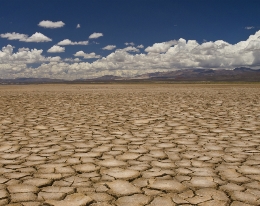04 June 2015
 When it comes to climate change it’s almost last chance saloon for the international community to act together and stop the slide into potential irreversible global warming.
When it comes to climate change it’s almost last chance saloon for the international community to act together and stop the slide into potential irreversible global warming.
This is one of the messages that Dr Constance Lever-Tracy, climate change specialist, and Adjunct Research Fellow of the Hawke Research Institute, makes clear on the eve of the European Union (EU)'s European Climate Diplomacy Day (June 17).
That day will see simultaneous climate awareness events take place across the world, encouraged by the EU, to raise awareness of climate change issues and to stimulate debate ahead of the United Nations (UN) Conference on Climate Change taking place in Paris in December.
Contributing to the initiative, UniSA’s Hawke EU Centre for Mobilities, Migrations and Cultural Transformations, in partnership with the EU Centre for Global Affairs at the University of Adelaide, will host its own European Climate Diplomacy Day event, including a screening of the documentary The Climate Blueprint which depicts the multiple rounds of international negotiations on climate change that have taken place over the last 20 years.
The event will include expert panel discussion on the impact of climate change, with representatives from the business and scientific community and speakers including Minister for Climate Change, Hon Ian Hunter MLC.
It’s a subject which links with the Centre’s aims as it seeks to develop dialogue and cooperation between the European community and Australia – particularly related to the migration and displacement of vulnerable people – a potential side effect of extreme climate change and its capacity to invoke natural disasters.
When it comes to outlining what the dangers are associated with climate change, Dr Lever-Tracy, who will be speaking at the event, dispenses with any vague generalities.
“There is global scientific agreement that to avoid the worst, including possible tipping points and irreversible runaway warming, global temperature rise must be limited to at most two degrees above pre-industrial times – the product of a maximum 450 parts per million of carbon dioxide (CO2) in the atmosphere,” Dr Lever-Tracy says.
“To stay within the two degree limit, the world must cap its total accumulated emissions to 565 gigatons of carbon dioxide.
“Currently available fossil fuel holdings are enough to produce 2795 gigatons, five times the scientific limit. Global subsidies for fossil fuel companies are estimated at $5.3trillion – $10million every minute – 6.5 percent of global gross domestic product, according to the International Monetary Fund.
“The same sums, if redirected, could establish an alternative, renewable global energy system.
“The main obstacles to a solution are not technological but political and economic, above all the narrow parameters of market mechanisms and the political power exerted by big corporations in support of their short term interests.”
Professor Anthony Elliott, Executive Director of the Hawke EU Centre says the global realities of changing climates and their associated catastrophes demands public attention, as never before.
“Dialogue between Australia and the EU in this context is crucial. It should encompass the full range of options – most fundamentally, economic and energy security interests, technology, state intervention as well as discussion of the limitations of the formal international climate negotiations,” Prof Elliott says.
“The Hawke EU Centre at UniSA is examining the climate problem from a variety of standpoints; historical, sociological, financial and geo-political. We are seeking to promote active public political debate in this area between Australia and the wider region and Europe.”
To register to attend the event and learn more about the panelists who will be speaking please refer to: www.unisa.edu.au/euclimateday
For further information: Dr Nicola Pitt, Centre Coordinator, Hawke EU Centre office (08) 8302 2949
email hawkeEUcentre@unisa.edu.au
For interviews: Dr Daniel Chaffee email Daniel.Chaffee@unisa.edu.au
Media contact: Will Venn office (08) 8302 0096 email Will.Venn@unisa.edu.au


